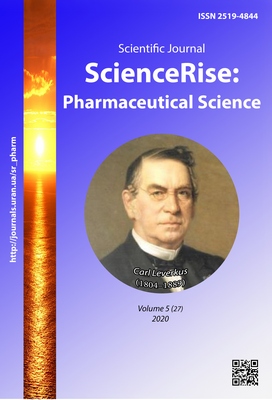Scientific and practical approachеs of formation of logistic innovative systems in pharmaceutical companies
DOI:
https://doi.org/10.15587/2519-4852.2020.214999Keywords:
logistics innovation system, pharmaceutical company, innovative medicine, information and innovation flowAbstract
The aim of the work is to analyze and generalize the existing scientific approaches and substantiate the mechanisms of formation of the logistics innovation system of the pharmaceutical company, which is the most important condition for creating modern effective domestic drugs under optimal use of resources and time.
Materials and methods. Studies were conducted using databases on the Internet: the State Expert Center, the Ukrainian Patent Office, scientific and metric databases. It has used retrospective, logical, graphic research methods, content analysis.
Results. The relevance of the implementation of the logistics concept of innovation management in domestic pharmaceutical companies is substantiated. A key aspect of this concept is the integration of individual parts of the innovation process through the maximum use of information exchange between participants in this process, active innovation, use of existing and creation of new knowledge, which become the main asset of innovation-oriented pharmaceutical company. The essence of the logistics innovation system of a pharmaceutical company is determined, the model of interrelations within the open logistics innovation system of a pharmaceutical company is substantiated. It is proved that with the help of a logistics innovation system it is possible to carry out planning, management, actualization of creation and implementation of innovative medicines at the optimal level of used resources and time for the implementation of relevant innovation projects. It is determined that the logistics innovation system of a pharmaceutical company is related to the management of incoming information and innovation flow (results of basic and applied research, data on clinical and preclinical study of medicines, pharmaceutical development), internal information and innovation flow (information exchange in the internal environment - resource, scientific and informational, organizational, personnel component), the initial information and innovation flow (information for government agencies, consumers, suppliers, the public, organizations interested in using the research results). These flows are integrated and relate to various aspects of the company's innovation.
Conclusions. Thus, in order to intensify and activize innovation in domestic pharmacy, it is promising to expand the scope of logistics methods for the development and implementation of innovative medicines. The purpose of the logistics innovation system is to provide the pharmaceutical company with the information necessary for completeness, relevance, reliability, timeliness at a rational cost of their provision, for effective management of material resources
References
- Citeline Pharma R&D Annual Review (2019). Pharmaprojects, 32. Available at: https://pharmaintelligence.informa.com/~/media/informa-shop-window/pharma/2019/files/whitepapers/pharma-rd-review-2019-whitepaper.pdf
- Mignani, S., Huber, S., Tomás, H., Rodrigues, J., Majoral, J.-P. (2016). Why and how have drug discovery strategies in pharma changed? What are the new mindsets? Drug Discovery Today, 21 (2), 239–249. doi: http://doi.org/10.1016/j.drudis.2015.09.007
- Schuhmacher, A., Gassmann, O., Hinder, M. (2016). Changing R&D models in research-based pharmaceutical companies. Journal of Translational Medicine, 14 (1). doi: http://doi.org/10.1186/s12967-016-0838-4
- Alex, A., Harris, C. J., Smith, D. A. (Eds.) (2016). Attrition in the Pharmaceutical Industry: Reasons, Implications, and Pathways Forward. John Wiley & Sons, 370.
- Cook, D., Brown, D., Alexander, R., March, R., Morgan, P., Satterthwaite, G. et. al. (2014). Lessоns leаrned frоm the fаte оf АstrаZenecа’s drug pіpelіne: а fіve-dіmensіоnаl frаmewоrk. Nature Reviews Drug Discovery, 13 (6), 419–431. doi: http://doi.org/10.1038/nrd4309
- Morore, J. F. (1997). The Death of Competition: Leadership and Strategy in the Age of Business Ecosystems. Harper Business, 320.
- Suruvka-Marshalek, D. (2005). Vplyv sytuatsii zakupivli na protses upravlinnia lantsiuhom postavok. Koncepcje i strategie logistyczne. Logistyka, 3, 17–18.
- Hryhorak, M. Yu., Savchenko, L. V. (Eds.) (2015). Innovatsiina lohistyka: kontseptsii, modeli, mekhanizmy. Kyiv: Lohos, 548.
- Krykavskyi, Ye. V. (2013). Vprovadzhennia protsesnoho upravlinnia u lohistychnu diialnist farmatsevtychnykh pidpryiemstv. Upravlinnia, ekonomika ta zabezpechennia yakosti v farmatsii, 2, 9–16.
- Posylkina, O. V., Sahaidak, R. V., Hromovik, B. P. (2004). Farmatsevtychna lohistyka. Kharkiv: Vyd-vo NFaU, Zoloti storinky, 320.
- Chernov, V., Dorokhov, O., Dorokhova, L. P. (2017). Fuzzy interaction modelling for participants in innovation development: approaches and examples. Bulletin of the Transilvania University of Brasov, 10 (2 (59)), 319–340.
- Elfimova, I. F., Tokarev, R. S. (2018). Upravlenie innovatsionnoi deiatelnostiu predpriiatiia na osnove logisticheskogo podkhoda. Ekonominfo, 4, 1–6.
- Chesboro, G. (2007). Otkrytye innovatsii: sozdanie pribylnykh tekhnologii. Moscow: Pokolenie, 336.
- Parfenova, S. L. (2014). Logisticheskii podkhod k upravleniiu potokami innovatsii. Upravlenie naukoi i naukometriia, 15, 148–159.
- Bogazova, A. T. (2018). Informatsionno-logisticheskie sistemy kak innovatsionnii instrument upravleniia na predpriiatiiakh. Dostizheniia nauki i obrazovaniia, 12 (34), 1–3.
- Pro vnesennia zmin do Poriadku provedennia ekspertyzy reiestratsiinykh materialiv na likarski zasoby, shcho podaiutsia na derzhavnu reiestratsiiu (perereiestratsiiu), a takozh ekspertyzy materialiv pro vnesennia zmin do reiestratsiinykh materialiv protiahom dii reiestratsiinoho posvidchennia ta zatverdzhennia Poriadku perevirky materialiv, dodanykh do zaiavy pro derzhavnu reiestratsiiu okremykh likarskykh zasobiv, shchodo yikh obsiahu (2015). Nakaz MOZ Ukrainy No. 460. 23.07.2015. Available at: https://zakon.rada.gov.ua/laws/show/z1210-15#Text
- Nastanova. Likarski zasoby. Farmatsevtychna rozrobka (ICH Q8) ST-N MOZU 42-3.0:2011 (2011). Kyiv: Ministerstvo okhorony zdorovia Ukrainy. Available at: https://compendium.com.ua/uk/clinical-guidelines-uk/standartizatsiya-farmatsevtichnoyi-produktsiyi-tom-1/st-n-mozu-42-3-0-2011/ Last accessed: 16.09.2020
Downloads
Published
How to Cite
Issue
Section
License
Copyright (c) 2020 Olga Posilkina, Elena Litvinova, Lisna Anastasiya

This work is licensed under a Creative Commons Attribution 4.0 International License.
Our journal abides by the Creative Commons CC BY copyright rights and permissions for open access journals.








